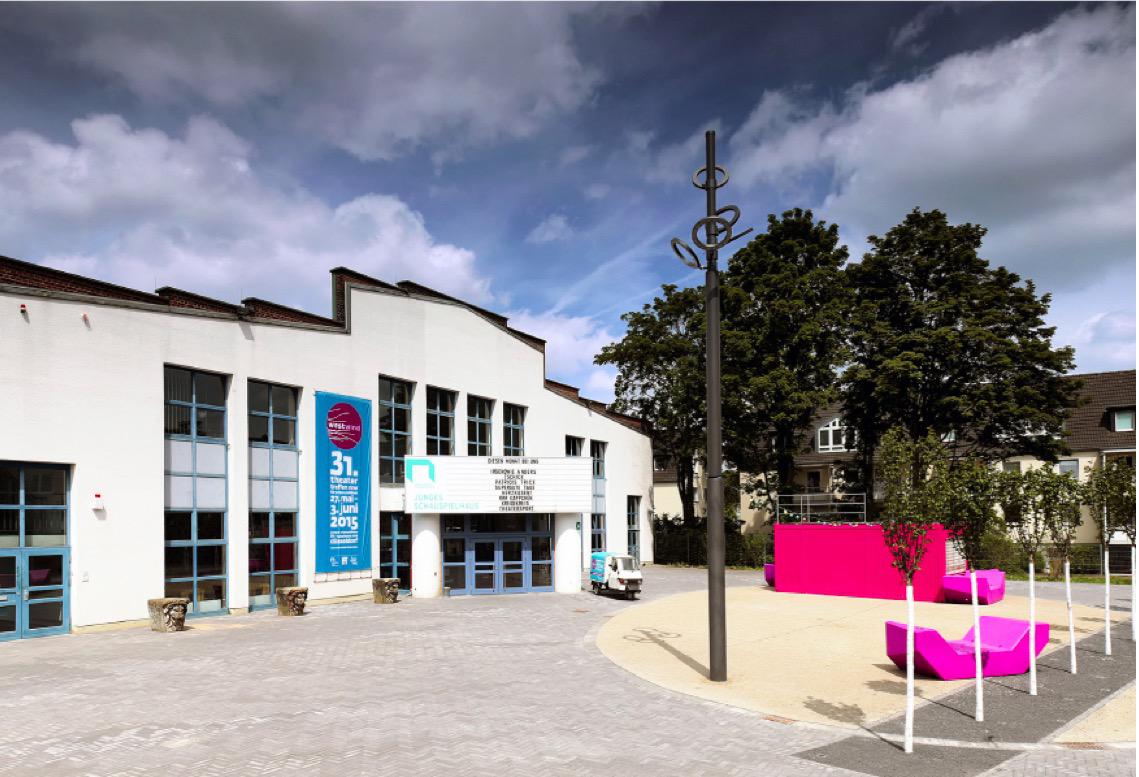JUNGES SCHAUSPIELHAUS RATH, DUSSELDORF, GERMANY

PROJECT DESCRIPTION
Located in the north-eastern part of Dusseldorf ’s fringe, Rath consists of heterogeneous housing areas. It still has affordable rents and traditional working- class districts, but it lacks public and green space, has several brownfield sites and deficits in the social structure and the educational level. In the last six years the funding provided by the Social City programme has improved living conditions by developing new housing projects, a new playground for kids, new public space anda new family centre building. This high density of social infrastructure, initiatives and activities has generated social cohesion. Rath has a commercial street and, like many district centres in the fringe, problems with vacancies and difficulties attracting customers. To counter these challenges, the Social City programme is financing a project called KIQ, which stands for Cooperation in the Neighbourhood.
Activating & experimenting
A committed architect is activating and organizing local residents to appreciate the individual residential real estate, to develop the retail real estate and to increase the attractiveness of public space. Recently, they organized a quick service to deal with illegal dumping of waste in the streets. To record and promote all the temporary activities, the architect designs beautiful, cheap and practical postcards of every event for the locals.
Social inclusion is not only about providing inclusive public space or designing mixed urban areas. It is also about people meeting one another. Sometimes this personal contact needs to be stimulated or framed. Düsseldorf was one of the first cities in Germany to have a youth theatre with young actors aiming at a young audience. In those days, “they tucked it away in the fringe”. Junges Schauspielhaus is located in a former bomb factory. This is very symbolical considering the aim of the theatre today to link all cultures. Not only do they have a set of very talented young actors with roots from all over the world, the Youth Theatre and the bar are actively linking refugees to locals from the neighbourhood and city. The café is an important pivot in bringing people together. It is open independantly from the activities in the theatre. Also the public space in front of the café is an important meeting place in the neighbourhood. It is a bit off, compared to the rest, and links the world of the youth and international culture with the surrounding people.
Financing
Under the umbrella of the Social City programme, the national and state governments have jointly supported the stabilization and upgrading of neighbourhoods affected by multiple types of deprivation. The programme pursues a cooperative strategy, transcending policymaking in the field of construction, and pooling other available public funds in the designated areas. The programme relies on a number of instruments and tools, such as the area-based approach, the bundling of resources, integrated development concepts, neighbourhood management, empowerment, participation, neighbourhood funds, evaluation and monitoring, and the stabilization of regeneration strategies beyond the period in which development grants are awarded. Its action fields and strategies comprise housing, upgrading of the residential environment and public spaces, ecology, transportation, social integration, education, culture, sports and leisure, public health, local economy, public safety, image and public relations. The programme aims at developing measures and projects that consider local needs in all relevant action fields. Empowerment and participation have a much higher status than in other grant programmes, since residents in areas funded by SocialCity often lack the resources required for civic engagement. Dusseldorf is in accordance with a specific Local Action Plan, already investing in three Social City areas by means of structurally-integrative and socially-integrative measures aimed at the sustainable improvement of local living conditions.
LESSONS LEARNED / RESULTS
The Social City urban development assistance programme, applied in Dusseldorf-Garath and Rath, is a unique tool for implementing integrated urban development concepts at the local level. The Social City process illustrates how cooperation within the administration, with business and civil society, can be beneficial for better life chances in the district. In addition, the tailored participation formats strengthen the trust of local
people in a public interest-oriented urban renewal policy.
DATA
City information
Population size: 501 th - 1 mPopulation development dynamics within the city administrative limits (at the time of the project): Growing
Population development dynamics of the functional urban area (at the time of the project): Growing
Website of the city: https://www.duesseldorf.de
Project information
Project territorial scale:
NeighbourhoodProject geographical area: Transitional area
Project/building proportions: 501-1000 sqm; Project Area: No data/not applicable
Project main actors: City Government; Resident association, group, citizens; Consultants, private professionals
Project dominant property ownership: Public
Project development stage (at the time of description): No data/not applicable
Project duration: No data/not applicable
Project starting date: 2015-2018



